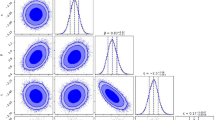Abstract
Vilkovisky has claimed to have solved the black hole backreaction problem and finds that black holes lose only ten percent of their mass to Hawking radiation before evaporation ceases. We examine the implications of this scenario for cold dark matter, assuming that primordial black holes are created during the reheating period after inflation. The mass spectrum is expected to be dominated by 10-gram black holes. Nucleosynthesis constraints and the requirement that the earth presently exist do not come close to ruling out such black holes as dark matter candidates. They also evade the demand that the photon density produced by evaporating primordial black holes does not exceed the present cosmic radiation background by a factor of about one thousand.
Similar content being viewed by others
References
Baumann, D.: Lectures on Inflation. arXiv:0907.5424 (2009)
Carr, B.J.: The primordial black hole mass spectrum. Astrophys. J. 201, 1–19 (1975)
Carr, B.J., Gilbert, J.H., Lidsey, J.: Black hole relics and inflation: limits on blue perturbation spectra. Phys. Rev. D 50, 4853–4867 (1994)
Carr, B.J.: Primordial black holes: Do they exist and are they useful? arXiv:astro-ph/0511743 (2005)
Carter, B., Davis, A.C.: Phys. Rev. D 61, 123501 (2000)
Giddings, S., Mangano, M.: Astrophysical implications of hypothetical stable TeV-scale black holes. Phys. Rev. D 78, 035009 (2008)
Hawking, S.W.: Particle creation by black holes. Commun. Math. Phys. 43, 199–220 (1975)
Koch, B., Bleicher, M., Stoecker, H.: Exclusion of black hole disaster scenarios at the LHC. Phys. Lett. B 672, 71–76 (2009)
Kohri, K., Yokoyama, J.: Primordial black holes and primordial nucleosynthesis I: effects of hadron injection from low mass holes. Phys. Rev. D 61, 023501 (2000)
Kolb, E.W., Turner, M.S.: The Early Universe. Addison-Wesley, Reading (1990)
Lindley, D.: Primordial black holes and the deuterium abundance. Mon. Not. R. Astron. Soc. 193, 593–601 (1980)
Novikov, I., et al.: Primordial black holes. Astron. Astrophys. 80, 104–109 (1979)
Page, D.: Particle emission rates from a black hole: Massless particles from an uncharged, nonrotating hole. Phys. Rev. D 13, 198–206 (1976)
Rothman, T., Matzner, R.: Upper limits on micro-mini black holes. Astrophys. Space Sci. 75, 229–336 (1981)
Vilkovisky, G.A.: Kinematics of evaporating black holes. Ann. Phys. 321, 2717–2756 (2006a)
Vilkovisky, G.A.: Radiation equations for black holes. Phys. Lett. B 634, 456–464 (2006b)
Vilkovisky, G.A.: Backreaction of the Hawking radiation. Phys. Lett. B 638, 523–525 (2006c)
Vilkovisky, G.A.: Post-radiation evolution of black holes. Phys. Rev. D 77, 124043 (2008)
Author information
Authors and Affiliations
Corresponding author
Rights and permissions
About this article
Cite this article
Larena, J., Rothman, T. Quasi-evaporating black holes and cold dark matter. Astrophys Space Sci 327, 71–76 (2010). https://doi.org/10.1007/s10509-010-0295-0
Received:
Accepted:
Published:
Issue Date:
DOI: https://doi.org/10.1007/s10509-010-0295-0



